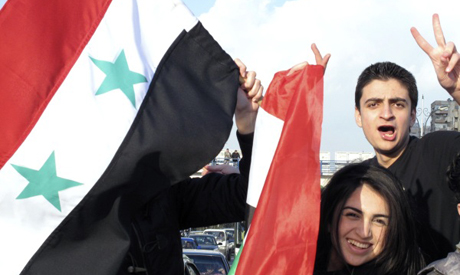
Supporters of Syria's President Bashar Al-Assad shout slogans as they hold a national flag in Damascus 25 March 2011. (Reuters)
Despite its denunciation of the use of force against civilian demonstrations in Arab countries since the beginning of the year, the Arab League has still to make any remark about the current violent response the regime of Bashar Al-Assad to protests in Syria.
The Cairo-based pan-Arab organisation was not planning, as of Saturday afternoon, five days into the Syrian demonstrations, to even go as far as to condemn the killing of over 50 civilians in demonstrations calling for political reform.
"We are following with great concern developments in Syria," said a senior Arab League official. He hastened to add, "And we are also following with great concern the situation in several other Arab countries, including Yemen, Libya and Jordan."
According to several Arab League sources, "no member state has until Saturday noon forwarded a request for a meeting on Syria".
"This is tricky. Syria is tricky," said another Arab League official. He added: "Syria is different from any other Arab country."
According to this Arab League official, as well as Arab diplomats, the reason that "Syria is different" is the over three-decade Israeli occupation of the Syrian Golan Heights.
Being a country under Israeli occupation, Arab diplomats agree, gives the ruling regime in Damascus a certain particularity the country is in effect in a state of war.
This does not cancel the Syrian right to democracy. "But you just have to worry about whether or not Israel has a hand in what is going on," said one Arab diplomat.
The same diplomat added that he has no information on any Israeli intervention in the current demonstrations: "none". He also said that no other Arab state has tabled any credible information to suggest that Israel is instigating current calls for reform in Syria.
"The Syrians are talking about 'foreign intervention'. This could be many things: it could be Israel or it could be some Iraqi forces trying to retaliate for previous Syrian intervention in Iraq, or some Western force," argued a regional intelligence source. He added that Damascus has provided information to back up its claims of foreign interference.
Meanwhile, Arab capitals are watching with unease as demonstrations in Syria gain momentum. Nobody seems to have a clear idea on how to deal with a "Libyan" scenario in Syria. Foreign intervention would be impossible in a country already occupied by Israel.
As such, Arab capitals are hoping that the package of reforms presented by the Assad regime will be accepted to the people.
"Syria is at what is rapidly becoming a defining moment for its leadership," suggested a recent brief report by the International Crisis Group (ICG). The ICG report added that for Assad "there are only two options". The first option, "involves an immediate and inevitably risky political initiative that might convince the Syrian people that the regime is willing to undertake dramatic change". The second, "entails escalating repression, which has every chance of leading to a bloody and ignominious end".
The ICG suggests that so far there is no sign that the Syrian regime is planning to abandon attempt to quell demonstrators. "Despite some regime concessions, forceful security measures and mounting casualties" remain in place, the report noted. The ICG noted that the "tragedy" of the southern Syrian city of Deraa, where the bloody confrontations between regime and demonstrators occurred, remain "isolated", but it could reoccur.
The ICG report also acknowledges the complaints of the Syrian regime over "foreign intervention". It refers to ruling regime concerns over "ethnic secessionism" and "sectarian retribution" in a country where a minority rules and controls. Still, it warns against "the current blend of mounting repression, blatant disinformation, minor concessions and presidential silence". "President Assad must show visible leadership and do so now. His political capital today depends less on his past foreign policy successes than on his ability to live up to popular expectations at a time of dangerous domestic crisis," concludes the ICG.
Meanwhile, a Syrian diplomatic source suggested to Ahram Online that Assad would address the nation over recent developments sooner rather than later .
Short link: